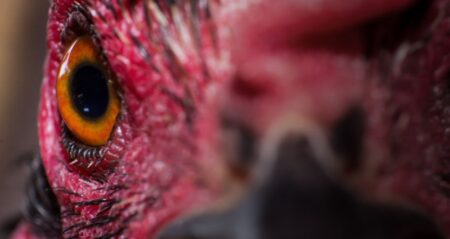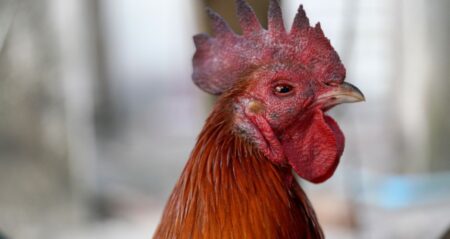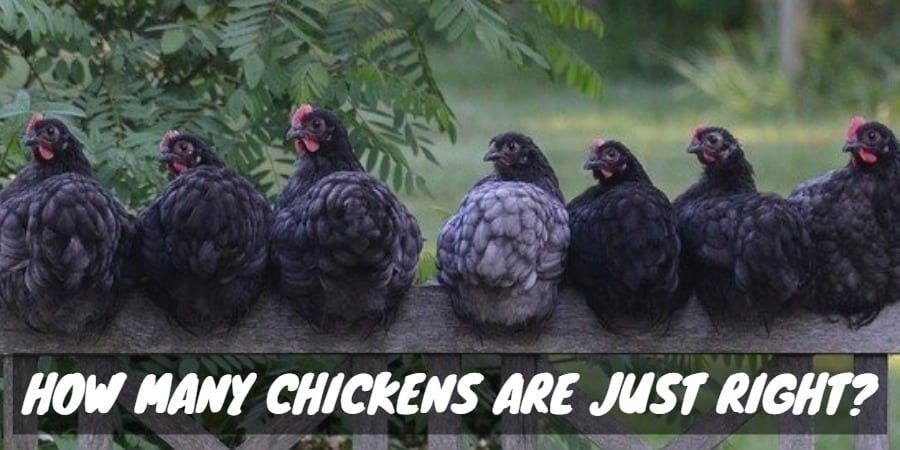A swollen eye is a pretty good indication of an impending problem for your chicken and should be taken seriously.
Swelling in the face and eyes can be a sign of a respiratory infection, a type of ring worm, ocular Marek’s, or something benign like debris in their eye.
Never the less, if your hen has a swollen eye it is something to be addressed as soon as possible.

What is Causing The Swelling in My Chickens Eye?
It is always alarming to find a hen in distress.
Chickens are fairly stoic animals and rarely show that they are injured until it is too late.
That is why it is so important to routinely check your chickens for their overall health (check out our post on Bumble Foot for more health check information for your flock).
If you notice your hen has a swollen eye they should immediately be removed from the flock and quarantined until you can ascertain the cause and appropriate treatment for the swelling.
What to Look For
A chicken’s eyesight is extremely keen and is vital to their ability to forage and “hunt”.
Problems with vision can be detrimental to the health and well-being of your hen, therefore it is important to be able to recognize signs of trouble so that illness can be prevented or treated in a timely manner.
While healthy chicken eyes can come in an array of colours they should be bright, wide open, and without discharge or swelling.
Chickens’ pupils should be black and round, without irregularity, and able to focus with changes in light.
If you notice your hen’s eyes are not healthy looking it could be an early sign of infection and should be addressed as soon as possible.
Causes of Swelling in Chickens Eyes
If your chicken has a swollen eye it may be something as innocent as some debris having gotten caught in their eyes or, it could be an indication of a much more serious ailment including:
- Mareks
- Coryza
- Eye Worms
Mareks
Mareks is almost the Voldemort of chicken tending. It is a serious and deadly illness that, if contracted, can wipe out an entire flock and make it next to impossible to irradiate.
How is Mareks Spread?
Mareks is spread by the feather dust, or feather dander, from an infected chicken.
Because of this, the disease can stay on the ground and can spread through a flock very quickly.
Mareks is most common in young chickens (ages three to thirty weeks old).
What are Symptoms of Mareks?
While the most obvious symptoms of Mareks is paralysis in the legs, it can also show up as ocular Mareks or as tumours on your hen.
Symptoms of Ocular Mareks
Because we are talking specifically about swollen eyes here, I want to focus on the nuances of ocular Mareks so that you know what to look for in your flock.
Symptoms of ocular Mareks are irregularly shaped pupils (shrunken pupils), grey or cloudy eyes, difficulty seeing and eventual blindness.
Most often, a chicken owner will notice that a hen appears aloof or startles easily due to a gradual loss of vision. This change in behaviour is a good indication that they should be looked over to identify potential problems.
What To Do If My Chicken Has Mareks
Mareks will eventually lead to a chickens death, and, if left untreated, can cause an entire flock to become infected.
The most humane thing to do is to dispatch, or euthanize, your chicken.
Coryza
It is a highly infectious respiratory illness, that can result in death if left untreated.
Symptoms of Coryza
Similar to numerous respiratory illnesses in chickens, the symptoms of Coryza include:
- Swollen eyes
- Pale comb
- Open mouth breathing
- Weakness or difficulty walking
- Lack of appetite
- Reduced egg laying
The most tell tale symptoms of Coryza are swollen/weepy eyes with a runny nose. You’ll notice a pungent and almost rancid odour with the nasal secretions.
Treatments for Coryza
Coryza is a bacterial infection that requires the use of prescription antibiotics from a veterinarian.
If you suspect that your hen has Coryza, you should immediately isolate your chicken as to reduce the likelihood of spreading the infection to the remainder of your flock.
Similar to Mareks, a hen who has had a Coryza infection, while they may survive with early intervention, will be a carrier of the infection for the balance of their lives and will require ongoing antibiotic treatment.

Eye Worms
You’re reading that correctly.
Chickens can get eye worms, or the Manson’s eye worm more specifically.
This repulsive sounding ailment is a type of roundworm that is more prevalent in tropical and subtropical regions.
How Do Chickens Get Eye Worms?
While they sound nasty, the likelihood of your flock becoming infected with eye worms is relatively low, eye worms are spread by Surinam cockroaches (the host of the infectious eye worm larva), or through exposure with wild birds.
Signs of Eye Worms
Manson’s eye worms make their home under the third eyelid of your chicken.
This causes discomfort, swelling, and cloudiness in the eyes.
Chickens with eye worms will scratch at and agitate their eyes which only causes further damage.
Treatment for Eye Worms
The leading treatment is a simple, over the counter, 5% credos solution which is applied routinely to the infected eye.
Debris or Injury Causing Swollen Eye
Debris
Yes, like any animal (even humans) chickens are susceptible to getting junk in their eyes that causes irritation and redness.
Before you panic and doom your hen to dispatch, it’s always prudent to check for any debris in your hen’s eye.
If you notice a foreign object you can gently run your hens eye under water or use a damp cloth to run their eye and assist in dislodging the irritant.
Injury
Chickens can be crazy and hostile little feather heads and can injure themselves or others accidentally or with malicious intent.
If you notice your hen has a swollen eye and see an abrasion it’s likely that the swelling is the result of an injury.
Allow your hen some time to heal by removing her to a dark room with food and water until the injury and swelling subside.
Conclusion
While it may be alarming to see your chicken with a swollen eye, it is not necessarily an indication of a life threatening infection or disease.
Check your chicken for foreign objects or injury, evaluate if they have a respiratory infection, or seek the advice of an avian veterinarian if you feel there is a more serious problem.




